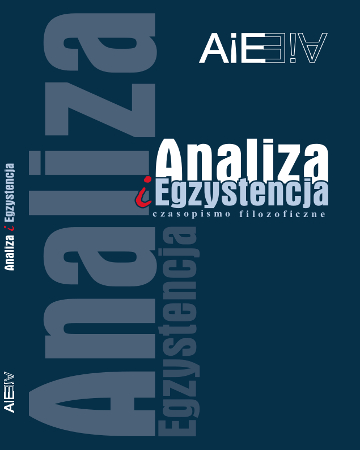
ISSN: 1734-9923
eISSN: 2300-7621
OAI
DOI: 10.18276/aie.2021.55-01





Issue archive /
55 (2021)
Aphantasia and the Language of Imagination: A Wittgensteinian Exploration
| Authors: |
Mélissa
Fox-Muraton
ESC Clermont/PHIER, Université Clermont Auvergne |
| Keywords: | aphantasia mental imagery language games imagination Wittgenstein |
| Data publikacji całości: | 2021 |
| Page range: | 20 (5-24) |
| Klasyfikacja JEL: | Z00 |
Abstract
Congenital aphantasia, or the complete absence of mental imagery, is a topic that has recently aroused the interest of researchers in many fields including philosophy, psychology and cognitive sciences. While it is generally supposed that we all have rich mental lives full of imaged representations, estimates suggest 2-3% of the population may have never formed an image or seen ‘in the mind’s eye.’ This paper aims to address the scepticism surrounding aphantasia, the challenges in communicating about mental imagery, and the research methods used in cognitive sciences today through the lens of Wittgenstein’s philosophy. The paper argues that 1) communicating about mental imagery involves language games that persons with aphantasia may not be able to play (i.e., makes reference to expressions and concepts that are meaningless for them, such as ‘visualise,’ ‘form an image,’ etc.); 2) that as a consequence aphantasia, in present research, is only describable negatively (as lack or incapacity); 3) that rather than a cognitive or a psychological issue, aphantasia should be understood as a grammatical one; and 4) that we need to invent new language games in order to come to a better understanding of conditions such as aphantasia, and to be able to appreciate the rich diversity and variability of human experience.
Download file
Article file
Bibliography
| 1. | Bernard, D.A.F. (1883) Clinique des maladies nerveuses: un cas de suppression brusque et isolée de la vision mentale des signes et des objets: formes et couleurs, Imprimerie Alcal-Lévy. |
| 2. | Botez, M.I. et al. (1985) Defective revisualization: dissociation between cognitive and imagistic thought case report and short review of the literature, Cortex, 21(3), 375-389. https://doi.org/10.1016/s0010-9452(85)80003-4 |
| 3. | Dawes, A.J. et al. (2020) A cognitive profile of multi-sensory imagery, memory and dreaming in aphantasia, Scientific Reports, 10. https://doi.org/10.1038/s41598-020-65705-7 |
| 4. | Faw, B. (2009), Conflicting Intuitions may be based on differing abilities: Evidence from mental imaging research, Journal of Consciousness Studies, 16(4), 45-68. |
| 5. | Fontani, G. et al. (2007) Effect of mental imagery on the development of skilled motor actions, Perceptual and Motor Skills, 105, 803-26. |
| 6. | Fox-Muraton, M. (2020) A world without imagination? Consequences of aphantasia for an existential account of self, History of European Ideas, https://doi.org/10.1080/01916599.2020.1799553. |
| 7. | Gaesser, B. & Schacter, D.L. (2014) Episodic simulation and episodic memory can increase intentions to help others, PNAS, 111/12, 4415-20. |
| 8. | Galton, F. (1880) Statistics of mental imagery, Mind, 5, 301-318. |
| 9. | Gauvry, C. (2017) Imagination, représentation et impression: Quelques remarques grammaticales de Wittgenstein, Bulletin d’analyse phénoménologique, XIII 2, 91-107. |
| 10. | Kendle, A. (2017) Aphantasia: Experiences, Perceptions, and Insights, Oakamoor: Dark River. |
| 11. | Keogh, R. & Pearson, J. (2018) The blind mind: No sensory visual imagery in aphantasia, Cortex, 105, 53-60. |
| 12. | Kosslyn, S.M., Behrmann, J. & Jeannerod, M. (1995) The Cognitive Neuroscience of Mental Imagery, Neurophysologia, 33/11, 1335-44. |
| 13. | Pearson, J. and Kosslyn, S. (2015) The heterogeneity of mental representations: Ending the imagery debate, Proceedings of the National Academy of Sciences, 112 (33), 10089-10092. https://doi.org/10.1073/pnas.1504933112 |
| 14. | Pearson, Joel et al. (2015) Mental Imagery: Functional Mechanisms and Clinical Applications, Trends in Cognitive Sciences, 19, 590-602. |
| 15. | Ross, B. (2016) Aphantasia: How it Feels to Be Blind in Your Mind, Facebook, 22 April 2016. https://fr-fr.facebook.com/notes/blake-ross/aphantasia-how-it-feels-to-be-blind-in-your-mind/10156834777480504/ |
| 16. | Sartre, J.-P. (2005) L’imaginaire: Psychologie phénoménologique de l’imagination, Gallimard. |
| 17. | Storlie, T. (2015) Person-Centered Communication: Mental Imagery and Imagined Interactions, Person-Centred Communication with Older Adults, ed. T. Storlie, Academic Press. |
| 18. | Tye, M. (1991) The Imagery Debate, MIT Press. |
| 19. | Vito, S. and Bartolomeo P. (2016) Refusing to imagine? On the possibility of psychogenic aphantasia. A commentary on Zeman et al. (2015), Cortex, 74, 334-35. |
| 20. | Watkins, N. (2018) (A)phantasia and severely deficient autobiographical memory: Scientific and personal perspectives, Cortex, 105, 41-52. |
| 21. | Wittgenstein, L. (1980) Remarks on the Philosophy of Psychology. Bemerkungen über die Philosophie der Psychologie, vol. II, trans. C.G. Luckhard & M.A.E. Aue, Blackwell Publishing. |
| 22. | Wittgenstein, L. (1981) Zettel, ed. G.E.M. Anscombe & G.H. von Wright, trans. G.E.M. Anscombe, Blackwell Publishing. |
| 23. | Wittgenstein, L. (2001) Philosophical Investigations, trans. G.E.M. Anscombe, 3rd edition (bilingual), Blackwell Publishing. |
| 24. | Zeman, A. et al. (2016) Reflections on Aphantasia, Cortex, 336-37. |
| 25. | Zeman, A. (2020a) Aphantasia, The Cambridge Handbook of the Imagination, ed. Anna Abraham, Cambridge University Press, 692-710. |
| 26. | Zeman, A. et al., (2020b) Phantasia—The psychological significance of lifelong visual imagery vividness extremes, Cortex, 130, 426-40. |
| 27. | Zimmer, C. (2010) The Brain: Look Deep into the Mind’s Eye, Discover, 22 March. http://discovermagazine.com/2010/mar/23-the-brain-look-deep-into-minds-eye |